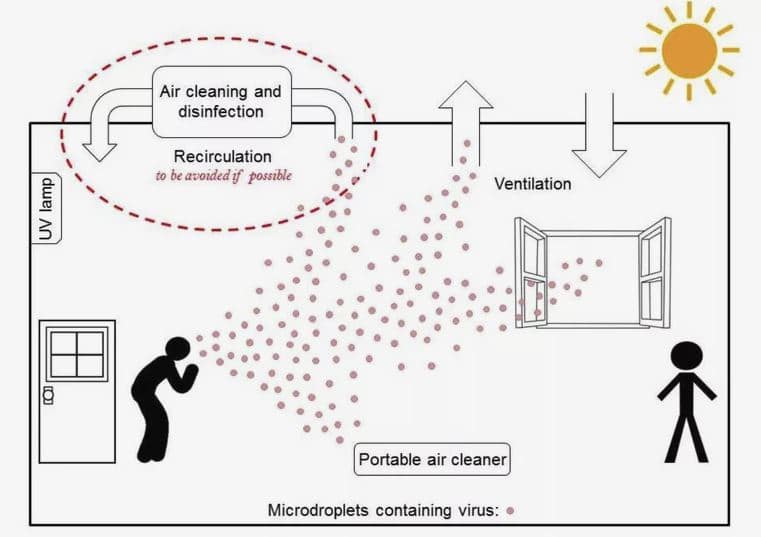-
Phone Number
-
Email Address
Though it apparently gives us the feeling or benefit of that keeping our home cool is a benefit for the health, unfortunately it has negative effects and impacts and it is important that we consider them before using them in our homes or businesses both excessively and inappropriately. Here we will see the negative effects of air conditioning and how to limit possible damage.
This article is not intended to scare anyone, we only want to explain and try to understand that the quality of the air that circulates inside our housing is important for our well-being and comfort heat, and that the facilities we use for our comfort, in this case, focusing on how it affects the air conditioning to people's health , it has an impact and negative consequences that must be known and respected.
If you want to know in depth the world of air conditioning, we have an extensive article on the classification of air conditioning systems in the building and its characteristics (Also the article detailed information about portable air conditioners).
First, we would like to provide a schematic generalization of the factors that can determine the indoor air quality in a home :

Remember that studies have shown that people who spend more time in air-conditioned environments have increased use of health care services.
Another interesting topic that we should know about is see what are the thermoregulatory mechanisms in human beings facing the cold :

Content menu:
If you need the air conditioner to adjust "to the perfection” all day long and beat that heat unbearable being always fresh, we just have to take into account that there are harmful effects and although it is not Let's note at the beginning, we have created an environment with thermal discomfort unbalancing the thermo-hygrometric conditions that our body and organisms accepts. And now, it's time to list them:
Dehydration rates are known to be more high in air-conditioned rooms . By we usually end up dehydrated if the air conditioning sucks too much humidity into the room and we are not careful in hydrating.
It happens when the temperature is set too low, we we feel too fresh to have the feeling of wanting drink water.
Another unfortunate side effect of spaces with air conditioning, especially if they are not maintained adequately, is your susceptibility to pains of headaches and migraines when air quality levels inside go down .

You might also end up with quite a headache if you are dehydrated as a result of being in a room or building for a long period. In fact, dehydration is a trigger for migraines that are often overlooked.
The respiratory symptoms affect the eyes, the nose and throat . Cold air can also affect the airway below the vocal cords and irritate the bronchial mucosa. They tend to appear much more in people who spend a lot of time exposed. These may include nasal obstruction, dry throat or even rhinitis.
As found in research, 28% of those who were in air-conditioned buildings experienced rhinitis, compared to only 5% of those in naturally ventilated buildings. About 35% of the People who lived in air-conditioned spaces had nasal obstructions, versus only 9 percent in buildings with natural ventilation.
Air conditioning could worsen allergies and even asthma . While staying within a air-conditioned space can be protective for some people who are sensitive to pollen or air pollutants air, there are others who find a situation of worsening.

The maintenance and cleaning of air filters conditioning is important, otherwise we run the risk of expose yourself to a host of triggers and microbes. It is recommended to change the filter every years (Obviously we will have to see its use) or at each maintenance scheduled by the manufacturer.
Dust is the great enemy of many people, we remember that We have an extensive guide on tips on how to clean the house and sanitize it thoroughly with many useful tricks.
Although it is designed to cheer us up and refresh us in hot moments… it can have the opposite effect! The Research indicates that people who live in buildings with air conditioning complain more of lethargy. In others words, could be to blame for his laziness and slowness inexplicable.
As one study found, if you work in a air-conditioned building is almost three times more likely that complains of lethargy that if it is in a space naturally ventilated. (See report point 3)
When summer arrives, excess air conditioning combined with sun exposure can produce itchy and dry skin . Although other symptoms they can disappear within a few hours of leaving the building, Getting rid of a dry skin problem is not that easy. Depending on the severity of the dryness, it could take us several days.
Researchers actually have a name for the symptoms of health problems that are related to the building, is called the « building syndrome sick «.
Although it is a condition that involves the entire building, is amplified with the use of air conditioning (AA) since we circulate the same air by a space repetitively which means that each we are more likely to inhale something unwanted.
To understand the adverse health effects of the sick building we show a small infographic with the most frequent characteristics and symptoms so that we are aware of its importance:
We can understand more about the health of buildings from this article where we investigate more.
Dry eye can cause itching and irritation of the eyes. eyes . They can also "burn" or itch. sometimes it can be so bad that vision becomes a bit blurry. and although these types of installations may not be a direct cause, it certainly helps. The problem seems to get worse when they pass long hours in an air-conditioned space.
Because air conditioners dry out nasal passages , can cause irritation to the mucous membranes and dry up the mucus. In the absence of a mucus adequate protector, we become more vulnerable to the attack of virus. In fact, notorious microbes like the bacteria that cause Legionnaires' outbreaks, for example, thrive in the artificial water supply systems, including those units and air conditioning systems.
Due to the change of environment, those who go from cold air to one hot or vice versa, can elicit a vagal reaction. Is an exaggerated response of the autonomic nervous system, which is manifested in a feeling of dizziness and sweating, usually they are subtle, but can become very intense.

The body's regulatory mechanism is very wise and when excess heat causes sweat naturally to refrigerate and preserve temperature balance body, but in the face of air conditioning, the body cannot adapt to the contrast of this environment created artificially.
It is very important that the skin and muscles do not receive a direct stream of air cold , since our body reacts causing a sudden muscular contraction that can cause anything from torticollis to facial paralysis, in the most serious cases.
In light of the global Coronavirus (COVID19) pandemic, many doubts are arising as to whether air conditioning can reproduce the virus or increase our risk.

For getting straight to the point, about the concern that the virus reproduced in AA facilities, the document concludes that “it doesn't make any sense”.
“The virus cannot reproduce without invading cells human, therefore the cleaning of ducts or the change of outdoor air filters have no practical effect, except when appropriate to carry it out", according to the report.
As we can see in the last two articles more relevant, in our opinion:
We must be aware and separate what is the domestic air conditioning (in houses) of the industrial one (from department stores, airplanes, industry, offices, buildings, etc) and always taking into account that possible changes in the installations – appliances, not always possible:
When there are doubts about a subject, the best thing to do is prevent if we are consistent and, as initial measures, we can:

At the moment, and with what we know about the virus, we cannot comment much more if we refer to the air conditioning domestic.
To avoid air-related health problems conditioning we actually have to follow some basic norms and that of course are based on coherence in the use of these devices:

As a curious fact, we have investigated in some manuals to see what it tells us about the use of the devices and the tips to avoid getting sick from the air cold . In reality, the directions are very brief. but we want to contribute them so that we have knowledge:

And remember that, although it does not affect our health, if at pocket where we can get energy savings even higher than 30% setting the refrigeration temperature at 26º C maximum. For every degree we reduce said temperature increases energy consumption by 8%.
In the following tool you can see the twelve that purify the air according to NASA and are exceptional for home or office:
We can also improve electricity savings in summer with our extensive article or reduce its use by of the advantages of using awnings.